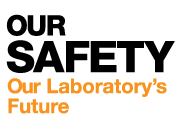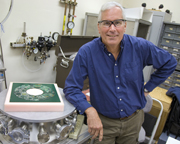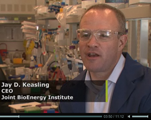



As Director of the Physics Division and Associate Laboratory Director for General Sciences, Jim Siegrist doesn't have a lot of downtime. But he's not so busy that he can't take time to ask his staff, "What do you think of safety? What do you think of your ergo set up?" While the Lab provides a number of tools that help Siegrist get answers to these questions, he has also been using a process known as "vertical slice" for the past 10 or so years to see what's working or how safety systems can be improved. More>
 [KQED] Imagine living cells acting as memory devices, biofuels brewing from yeast, or a light receptor taken from algae that makes photographs on a plate of bacteria. With the new science of synthetic biology, the goal is to make biology easier to engineer so that new functions can be derived from living systems. Find out the tools that Bay Area synthetic biologists are using and the exciting things they are building. Acting Deputy Lab Director Jay Keasling is featured in this broadcast. More>
[KQED] Imagine living cells acting as memory devices, biofuels brewing from yeast, or a light receptor taken from algae that makes photographs on a plate of bacteria. With the new science of synthetic biology, the goal is to make biology easier to engineer so that new functions can be derived from living systems. Find out the tools that Bay Area synthetic biologists are using and the exciting things they are building. Acting Deputy Lab Director Jay Keasling is featured in this broadcast. More> ![]()
 [Physics] Following the path of a single atom or point defect as it diffuses inside a solid remains one of the most sought after but undemonstrated feats of microscopy. In a paper in Physical Review B, Sefa Dag and Lin Wang, with the Lab's Computational Research Division, and Damien Alloyeau and Christian Kisielowski, with Materials Sciences, report their use of one of the new aberration-corrected transmission electron microscopes and claim to have imaged the three-dimensional positions of germanium self-interstitials generated by the beam [1]. Have they finally succeeded in imaging diffusion? More>
[Physics] Following the path of a single atom or point defect as it diffuses inside a solid remains one of the most sought after but undemonstrated feats of microscopy. In a paper in Physical Review B, Sefa Dag and Lin Wang, with the Lab's Computational Research Division, and Damien Alloyeau and Christian Kisielowski, with Materials Sciences, report their use of one of the new aberration-corrected transmission electron microscopes and claim to have imaged the three-dimensional positions of germanium self-interstitials generated by the beam [1]. Have they finally succeeded in imaging diffusion? More>
 Gravitational lensing is explained by Einstein's general theory of relativity: galaxies and clusters of galaxies, which are very massive objects, act on spacetime by causing it to become curved. Alexie Leauthaud and Reiko Nakajima, astrophysicists with the Berkeley Center for Cosmological Physics, will discuss how scientists use gravitational lensing to investigate the nature of dark energy and dark matter in the universe today at noon in the Building 66 Auditorium. More>
Gravitational lensing is explained by Einstein's general theory of relativity: galaxies and clusters of galaxies, which are very massive objects, act on spacetime by causing it to become curved. Alexie Leauthaud and Reiko Nakajima, astrophysicists with the Berkeley Center for Cosmological Physics, will discuss how scientists use gravitational lensing to investigate the nature of dark energy and dark matter in the universe today at noon in the Building 66 Auditorium. More>
Science and operations supervisors are invited to attend a free, half-day "scenario workshop" that focuses on three common-yet-complex human resource issues. The class takes place Wednesday, August 12 in Perseverance Hall from 12:30 to 4 p.m. The workshop is sponsored by the Berkeley Lab Learning Institute (BLI). Participants will work in groups to discuss how best to resolve the issues and then compare their responses to recommendations by Lab subject-matter experts. Go here for more information, and here to register.
Today at Berkeley Lab is produced by Public Affairs' Communications Department